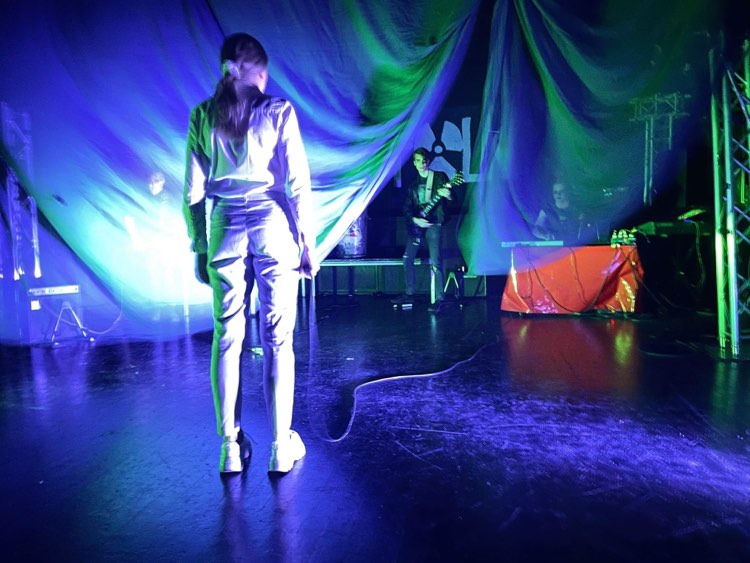Turning it sustainable: implementing sustainability goals in theatre productions at NTNU
DOI:
https://doi.org/10.7577/ar.5247Keywords:
sustainable theatre, ecotheatre, climate policy, UN sustainable development goals, creative expressionAbstract
This article proposes ways of implementing sustainability goals in theatre productions to create interesting creative expressions. It is a case study that examines the work done by the author in the first-year bachelor course on “Theatre Production” in 2021-2023, to turn the course sustainable by addressing UN Sustainable Development Goal no. 12 “Responsible Consumption and Production”.
In the article, I describe the course’s design and curatorial choices, and the tools used to identify and implement sustainable goals. I discuss the impact of integrating the 4R principles (Reuse, Reduce, Repurpose, Recycle) and the Climate Policy and Action Plans in the creative process. I then argue that the qualities of the sustainable process – the counting and the measuring – impact the artistic choices in unexpected ways.
Cover image: From the performance “People and their enemies” (2021). Photo: Elena Perez
Downloads
References
Austring, B. D. (2020). Bæredygtighet som kreativt benspænd. DRAMA: Nordisk dramapedagogisk tidskrift No. 2, 54-57. https://doi.org/10.18261/issn.2535-4310-2020-02-13
Balcare, K. (2023) Reduce, reuse, or refuse? Pioneering sustainability in the theatre scene in Latvia. Nordic Theatre Studies, 34(1), 109-126. https://doi.org/10.7146/nts.v34i1.137929
Beer, T. (2021) Ecoscenography: An Introduction to ecological design for performance. Palgrave Macmillan. https://doi.org/10.1007/978-981-16-7178-4
Bjerrum, C. G. & Teglgaard J. (22.03.2023) Lecture on sustainability in DRA1003. (Blackboard) https://ntnu.blackboard.com/
Bæredygtig kulturliv nu (2023) Bæredygtig kulturliv nu. https://www.baeredygtigscenekunst.nu/guide/
Bæredygtig scenekunst nu (2020a) Guide til bæredygtig produksjon. Bæredygtig scenekunst nu https://www.baeredygtigscenekunst.nu/guide/
Bæredygtig scenekunst nu (2020b) Case studie i bæredygtig scenekunstproduksjon. FRONTLØBERNE af MÆRKVÆRK. https://www.baeredygtigtkulturliv.nu/guides/casestudie-i-baeredygtig-teaterproduktion
Buro Happold (2021) The theatre green book. Sustainable productions. Buro Happold https://theatregreenbook.com/book-one-sustainable-productions/
Byrn, W. (2023). Introducing behavioral wedges and nudging into the production process to reduce CO2 : Frontløberne and the first attempt to create a CO2 neutral production in denmark. Nordic Theatre Studies, 34(1), 90–108. https://doi.org/10.7146/nts.v34i1.137928
Chaudhuri, U. & Enelow, S. (2014). Research theatre, climate change, and the ecocide project: A casebook. Palgrave Macmillan. https://doi.org/10.1057/9781137396624
Cless, D. (2010). Ecology and environment in european drama. Routledge. https://doi.org/10.4324/9780203851814
Dybdahl, M. (28.05.2022) Bærekraftig eksamen. Adresseavisen. https://www.adressa.no/magasin/i/G374wl/victoria-20-jeg-er-en-person-som-liker-a-underholde
Fried, L. K. & May, T. (1994) Greening up our houses: A guide to a more ecologically sound theatre. Drama Book Publishers.
Garret, I. (2012) Theatrical production’s carbon footprint. In W. Aarons W. & T. May (Eds.) Readings in performance and ecology. Palgrave Macmillan, pp. 201-208. https://doi.org/10.1057/9781137011695_18
Javorovic, B.E (2021, 3. may) Eksamen for disse studentene er å gjøre teater bærekraftig. Universitersavisa. https://www.universitetsavisa.no/baerekraft-det-gronne-skiftet-institutt-for-kunst--og-medievitenskap/eksamen-for-disse-studentene-er-a-gjore-teater-baerekraftig/194101
Julie’s Bicycle (2023) About JB. Julie’s Bicycle. https://juliesbicycle.com/
Julie’s Bicycle (2013) Sustainable production guide. Julie’s Bicycle. https://juliesbicycle.com/resource/sustainable-production-guide/
Lavery, C. (2018). Performance and ecology: What can theatre do? Routledge. https://doi.org/10.4324/9781315149172
May, T. J. (2020). Earth matters on stage: Ecology and environment in american theater. Routledge. https://doi.org/10.4324/9781003028888
Mitchell, K. (2009) The director's craft: A handbook for the theatre. Routledge.
NTNU (2023a) DRA2002: Project theatre for young audiences. Courses at NTNU. https://www.ntnu.edu/studies/courses/DRA2002#tab=omEmnet
NTNU (2023b) DRA3000: Research methods in theatre. Courses at NTNU. https://www.ntnu.edu/studies/courses/DRA3000#tab=omEmnet
NTNU (2023c) DRA6200: Dramatherapy. Courses at NTNU. https://www.ntnu.edu/studies/courses/DRA6002#tab=omEmnet
NTNU (2023d) DRA1003: Theatre production. Courses at NTNU. https://www.ntnu.edu/studies/courses/DRA1003#tab=omEmnet
Petrikas, M., & Tanskanen, K. (2023). Theatre and Social Responsibility: An Introduction. Nordic Theatre Studies, 34(1), 1-3. https://doi.org/10.7146/nts.v34i1.137921
Sande, Hege K. (2023). Ny strategiperiode for et livskraftig scenekunstfeltet. Performing Arts HuB Norway. https://www.pahn.no/nyheter/livskraftig?fbclid=IwAR0JKqaizoKaSCKnRB0eS592-9MTY9arSU_-dGobdIAxMJANtmiT6eiU4qM
United Nations (2023) Sustainable Development, Goal 12. United Nations, The 17 Goals. https://sdgs.un.org/goals/goal12

Downloads
Published
How to Cite
Issue
Section
License
Copyright (c) 2023 Elena Pérez Rodriguez

This work is licensed under a Creative Commons Attribution 4.0 International License.
Authors who publish with this journal agree to the following terms:
- Authors retain copyright and grant the journal right of first publication with the work simultaneously licensed under a Creative Commons Attribution License that allows others to share the work with an acknowledgement of the work's authorship and initial publication in this journal.
- Authors are able to enter into separate, additional contractual arrangements for the non-exclusive distribution of the journal's published version of the work (e.g., post it to an institutional repository or publish it in a book), with an acknowledgement of its initial publication in this journal.
- Authors are permitted and encouraged to post their work online (e.g., in institutional repositories or on their website) prior to and during the submission process, as it can lead to productive exchanges, as well as earlier and greater citation of published work (See The Effect of Open Access).